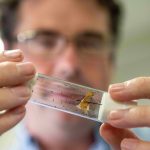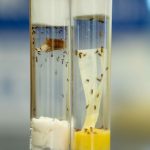
MAFES researcher spotlight – April 2024 – Dr. Philip Fanning
Philip Fanning, Assistant Professor of Agricultural Entomology
School of Biology and Ecology
How I got here:
I grew up on a small dairy farm in Tipperary, Ireland. Living on a farm is what I credit for my interest in becoming a scientist. I completed my Bachelor of Environmental Science degree at University College Cork. I went on to do a Master of Science in Environmental Science focusing on freshwater ecology at the University College Dublin. I remained at University College Dublin as a Walsh Fellow to complete a PhD in Environmental Biology focusing on Entomology. My PhD was co-sponsored by the University College Dublin and Teagasc (Ireland’s Extension Service). My PhD focused on defoliating beetles on biomass crops in Ireland, with one target species being a pest in cut foliage crops.
After completing my Ph.D., I immigrated to the United States in 2015. I joined the Isaac’s lab at Michigan State University and was a postdoctoral research associate from 2016 to 2019. Then, I joined the University of Maine’s School of Biology and Ecology faculty in 2020 as an Assistant Professor of Agricultural Entomology.
Current role within MAFES:
My current research with the Maine Agricultural and Forest Experiment Station (MAFES) focuses on the sustainable management of insect pests in Maine lowbush blueberries. The overarching goal of this research is to help Maine’s wild blueberry grower manage any pests in an economically viable and environmentally sustainable way and ensure that we maintain healthy populations of beneficial insects such as pollinators.
Outside of research, I teach Integrated Pest Management and Introduction to Insect Identification in the School of Biology and Ecology. Additionally, for our service mission, I work closely with multiple different entities, such as the University of Maine’s Cooperative Extension, to deliver research outputs to Maine’s 512 wild blueberry growers, who farm 46,370 acres, and others, such as the public, especially on bees including interactions with beekeepers, schools, and individuals.
Key research goals of my lab:
Here in the MAFES, I aim to conduct current research in my lab group that focuses on the ecology and behavior of insects in agricultural systems. The key goals of my research group are the study of 1) insects that are significant agricultural pests, 2) their associated natural enemies within agricultural systems and in the surrounding landscapes, 3) the evaluation and optimization of pest management programs, and 4) the development of sustainable, alternative management tactics towards the goal of conservation of biological control and pollinators.
One such pest is the invasive vinegar fly, Spotted-wing Drosophila. Since its initial detection in Maine’s wild blueberry fields in 2012, Spotted-wing Drosophila has become an economic pest for wild blueberry growers. While the adult population’s timing and severity varies annually, it increases growers’ costs in some years. Starting in 2020, research activities in my lab focused on continuing projects to generate data on the biology and management of Spotted-wing Drosophila in wild blueberries. These activities were primarily funded by the Wild Blueberry Commission of Maine and multiple grants financed by the USDA’ National Institute of Food & Agriculture programs.
My team has been focused on new variations of classical biological control options for Spotted-wing Drosophila, utilizing the Samba wasp. The Samba wasp, which is smaller than a grain of rice, is a larval parasitoid; the adult female can detect larvae of the flies under the fruit’s skin and inject its eggs into them. In the past two years, my lab has released thousands of these tiny USDA-approved parasitoid wasps at sites across Maine in the hope that they will eventually reduce populations and growers’ costs.
- Dr. Fanning inspects his Samba wasp specimens.
- Samba wasps (Ganaspis brasiliensis) left and Spotted-wing Drosophila (Drosophila suzukii) right.


